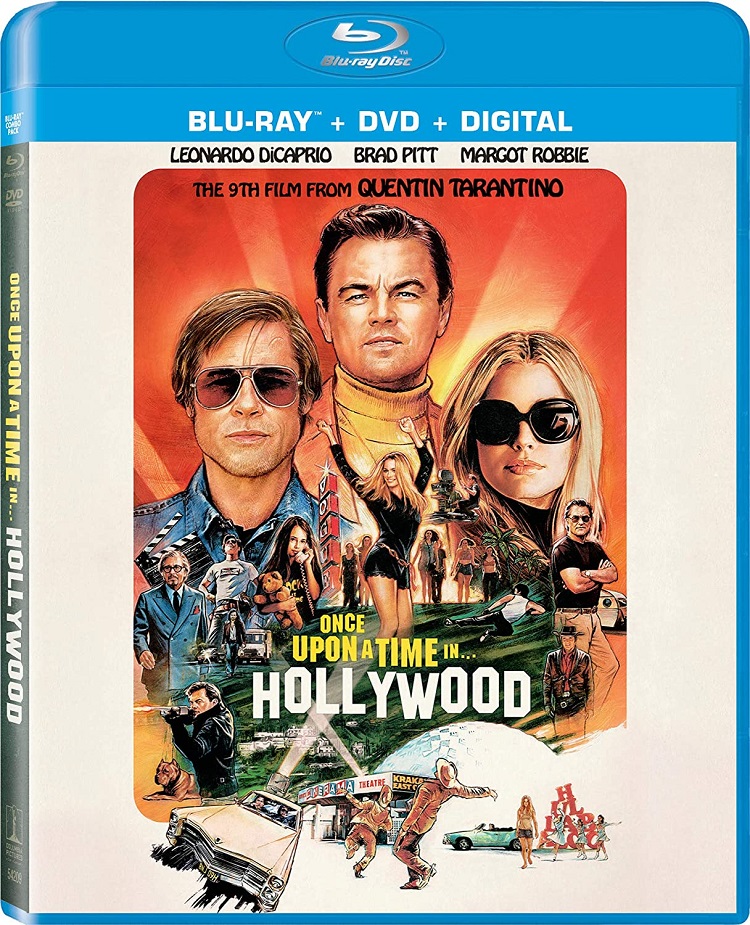
Quentin Tarantino’s previous feature The Hateful Eight was a demonstration of both his strongest and weakest qualities as a filmmaker. His follow-up, the highly anticipated Once Upon A Time…in Hollywood is mainly a showcase for one of his strongest qualities: His love for classic cinema. While there is something to be said about how controversial his filmography is along with his personality, his passion for classic genres always shines through in his work and here, it’s no different.
That being said, the nostalgic ’60s setting is the only thing that makes this film an ode to old cinema. Because the Manson murders are woven into the storyline, that gives the picture some historical context which is another Tarantino trademark. Yet, that plot point still proves to be completely unnecessary. It’s mainly about a faded movie star named Rick Dalton (Leonardo DiCaprio) trying to cope with his obscurity with his stunt double Cliff Booth (Brad Pitt) always accompanying him.
Because the film didn’t need to show the Manson cult, the character of Sharon Tate, played by Margot Robbie, being written out wouldn’t have a great impact. Although Academy Award-nominee Margot Robbie has third billing and was prominently featured in the marketing, she still hardly has any dialogue or things to do. Admittedly, Robbie is given one moment of poignancy where Tate attends a theater showing of The Wrecking Crew, feeling moved as the audience is enjoying her performance.
It’s the only moment where Tate is given any sense of character, though, because she’s mostly shown as eye candy with the male characters discussing how they see her. In addition, Tate being underwritten is part of an ongoing regressive trend from Tarantino. While the women in this film aren’t constantly brutalized like in Tarantino’s last two features, they’re still mostly portrayed as fetishizations rather than characters.
Despite Tarantino being a renowned screenwriter, the screenplay is an ironic weak spot. Along with the female characters being poorly written, there’s a subplot involving Booth’s deceased wife that goes nowhere and makes the film longer than needed. Granted, excess is one of Tarantino’s specialties whether it’s lengthy dialogue or multiple storylines, but because the movie is meandering with no concrete story, there could’ve been some omitted pages.
As for where the film thrives, it’s easily the two performances from Leonardo DiCaprio and Brad Pitt. DiCaprio delivers a performance as an incredibly fragile film star that easily tops his Oscar-winning turn in The Revenant. His expressive eyes consistently show feelings of both conceit and anxiety over what lies ahead in the future. Meanwhile, Brad Pitt is the acting MVP as Cliff Booth, demonstrating layers of wry humor, melancholia, and assurance beneath his traditional movie-star charm. The rest of the packed ensemble, which includes names such as Timothy Olyphant, Kurt Russell, Margaret Qualley, Mike Moh, Al Pacino, and Bruce Dern, does fine work, but it’s really the DiCaprio and Pitt show.
Then there’s the costume design by Arianne Phillips who does an expert job at capturing the ’60s feel. Plus, editor Fred Raskin makes the nearly three-hour runtime feel shorter than it is. Even if the film didn’t need to be as long as it is, Raskin is able to ensure that watching it doesn’t feel like an obstacle. Along with DiCaprio and Pitt, Raskin easily holds the picture together.
In closing, Once Upon A Time…in Hollywood feels like it’s two movies rolled into one. One is an intimate drama about a Hollywood friendship and the other is a depiction of one of America’s most horrific crimes. Neither film exactly comes together. It tries to be an ode to Old Hollywood but only the costumes, soundtrack, and production design help create the desired saccharine feel. Thankfully, the two lead actors easily carry the picture the way a movie star can even though they’re stuck with an aimless story. For what it’s worth, its ponderous approach makes it a surprise departure from Tarantino’s typically ultraviolent filmography. However, it still doesn’t reach the same heights as Jackie Brown or Pulp Fiction.